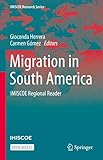Migration in South America [electronic resource] : IMISCOE Regional Reader / edited by Gioconda Herrera, Carmen Gómez.
Material type: TextSeries: IMISCOE Research SeriesPublisher: Cham : Springer International Publishing : Imprint: Springer, 2022Edition: 1st ed. 2022Description: XV, 225 p. 10 illus. online resourceContent type:
TextSeries: IMISCOE Research SeriesPublisher: Cham : Springer International Publishing : Imprint: Springer, 2022Edition: 1st ed. 2022Description: XV, 225 p. 10 illus. online resourceContent type: - text
- computer
- online resource
- 9783031110610
- 304.8 23
- JV6001-9480
- HB1951-2577
Part 1. Emerging Mobilities and Old Exclusions -- 1. Extractivist Economy, Mobilities and Exclusions: The case of Large Copper Mining in the City of Antofagasta (Carolina Stefoni, Fernanda Stang and Pablo Rojas Varas) -- 2. New Spaces of Transit within South America: The Outline of the Migratory Transit Corridor Andean Region-Southern Cone countries-Brazil (Soledad Álvarez Velasco) -- 3. Rethinking “mixed flows”: An analysis from the Experience of Haitian, Colombia and Venezuelan Migration to Ecuador (Carmen Gómez and Gioconda Herrera) -- Part 2. Law and Migration Policies: From Human Rights to Border Closures -- 4. Contradictions and Shifts in Discourse and Application of the Refugee System: Colombian Forced Migrants in Ecuador (Jeffrey Pugh) -- 5. Exposed Hostility: The Politics of Deportation in Argentina (Eduardo Domenech) -- 6. The New Brazilian Migration Policy: Haitian and Venezuelans Flows and North Amazon border (Tânia Tonhati and Leonardo Cavalcanti) -- 7. Migration and Legal Pluralism: Coyoterismo, and Legal Strategies in Cañari migration to the US (Ulla Berg and Lucía Pérez Martinez) -- Part 3. Racism and Xenophobia and Struggles over Migrant´s Rights -- 8. Exclusive Migration Policy and Xenophobia towards the Venezuelan Population in Peru (Cecile Blouin and Cristina Zamora) -- 9. Experts, Resources and Infrastructure: Three Ways of Building Racism against Migrants in Chile´s Health System (Maria Emilia Tijoux and Constanza Ambiado Cortés) -- 10. Migrant´s Organizations, Social Categories and Inequalities in Contemporary Argentina (Sergio Caggiano).
Open Access
This open access regional reader examines emerging issues around new migration patterns in South America and their relationship with changing migration policies over the last twenty years. The first part of the book looks at conceptual discussions on mixed and survival migration, the link between migration and extractivism, and the specific character of transit migration. A second part examines how these debates have led to transformations in state policies, and the shift in government policies from a human rights-based approach towards more restrictive ones. Finally, the third section revisits the relationship between racism, xenophobia and colonialism in contemporary migrations. As such this book makes an interesting read to students, academics, policy makers and all those working in the field.
There are no comments on this title.


